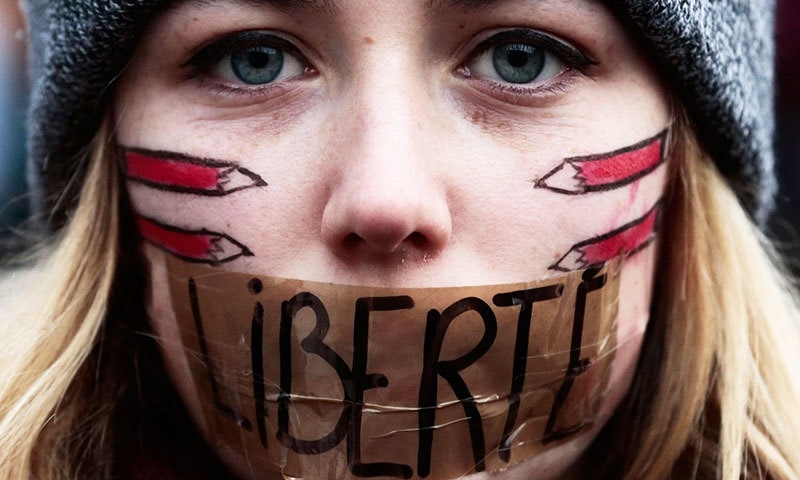When trimmed down from a universal right to a privilege enjoyed by the favoured class of people, ‘freedom of expression’ becomes a corrupted item in the toolbox of imperialists.
As a writer, there are few things in life as meaningful to me as chai and freedom of expression. And in a satirically termed ‘Banistan’, liberal artform is nothing if not subtle.
Pakistanis are not the flagbearers of free speech, but to our credit, nor do we pretend to be. My concern at the moment, is those who do.
On January 11, 2015, millions of French people reaffirmed their country’s commitment to free speech.
But on January 14, 2015, French comedian Dieudonne was arrested for an offensive Facebook post. Many more were detained and questioned by the police in that country for allegedly “glorifying terrorism”, including a confused eight-year-old school kid.
Of the 486 legal cases linked to Charlie Hebdo, 257 were against people accused of condoning terrorism through their speech.
More recently, the French high court upheld the criminal conviction of 12 activists for anti-Israel activism. They were arrested for wearing T-shirts emblazoned with the words, “Long Live Palestine, Boycott Israel”, while handing out fliers arguing that buying Israeli products “legitimises crimes in Gaza”.
Also read: J.K. Rowling, why do you oppose the cultural boycott of Israel?
The verdict indirectly declares anti-Israeli activism the equivalent of anti-Semitism. One could similarly argue that activism against Saudi Arabia is essentially the product of anti-Arab racism, or protest against the Islamic Republic of Iran, a manifestation of anti-Muslim bigotry, but not in a French court.
It is also worth noting that freedom of ‘religious’ expression is always negotiable in France.
Even those who object to the use of face veil have marveled at France’s obsession with burqa – a garment worn by a small minority of the country's Muslim minority. And as I see it, France's eagerness to rescue the ethnic woman from herself by banning the garment, is a little perturbing.
The irony has not flown unnoticed by prominent French thinkers like Emmanuel Todd who, in his best-selling book, expertly argues that the marches of Jan 11, 2015 were about cultural domination of the minorities and not freedom.
There is not merely a French internal affair. Countries like France have taken charge of deciding on behalf of us all what is objectively offensive.
Also read: Does a long, black skirt flout France's treasured secularity?
John Oliver ridiculed the people of Thailand for their widespread use of Hitler imagery. Pakistan is often glared at for the tasteless swastika stickers on many motor vehicles across the country, and international outrage ensued after a clothing store named ‘Hitler’ opened up in India.
While the deliberate use of these icons to glorify mass-murder is indefensible, a non-European may reasonably be excused for not knowing European history.
After all, the swastika has been a peaceful part of East Asian history for thousands of years before its adoption by Europeans and then perversion in relation to the Nazi regime. Not every non-European may know its meaning in the European context, as well and gasp at it wherever sighted.
Western nations take for granted that the rest of the world knows their history, languages, and customs, and thinks precisely as they do. And therefore, it feels that what is offensive to the West is offensive universally, whereas that which offends everyone else is okay to carry on.
Perhaps, that is also the reason Holocaust denial is illegal in France under the Gaysott Act of 1990, while denial of the Armenian genocide is protected under ‘free speech’.
Also read: Beyond Charlie
It is because of traditions like these, that ‘freedom of speech’ is often misconstrued as a Western construct.
Charlie Hebdo did not say “Bol, ke lab azad hain tere!” (Speak, for your lips are free); it was Faiz Ahmed Faiz.
‘Toba Tek Singh’ was not penned by a Danish author; it was written by Manto.
The need for freedom of speech has been agreed upon by artists and academics of all cultures, including those from Pakistan.
However, freedom of expression is not for the establishment to dole out at its own convenience to people it finds worthy of possessing it. Free speech for the chosen few is no freedom at all.
If France cannot make good on its promise of liberté, it may consider cutting down on its grandstanding before the irony becomes too great to ignore.
















































